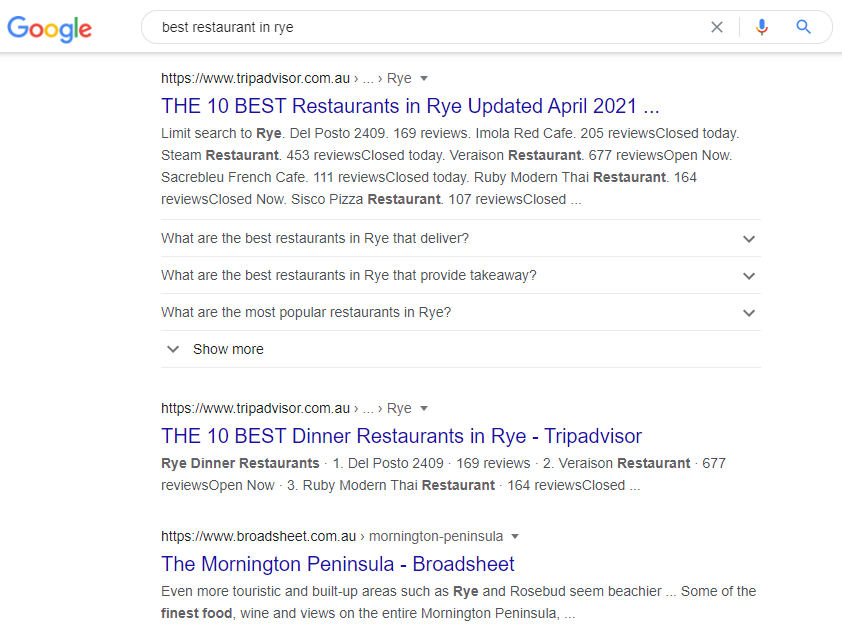We’re going to take a bet and say you’ve used a search engine before. Assuming you’re a business owner, you’re probably also aware that SEO is an important aspect of getting people to your business’ website.
Maybe you’ve tried to improve the SEO of your site or hired an agency to do so. Maybe you have a good understanding of SEO, but you still don’t completely know how search engines work.
Well, read on. We’ll go into it.
Search Engine Functioning Basics
Basically speaking, when a user gives a search engine a query, the search engines attempts to serve that user with the best response to that query.
So, if a user types in “best restaurant in Rye,” the search engine, such as Google or Bing, will give the user information about places to eat in Rye. The search engine likely won’t give specific restaurants at the top of the page but will likely give listings of restaurant review sites and the like (more on this later).
How Do Search Engines Determine The Best Response?
There are a myriad of ranking signals that go into a search engine’s decision to place a specific site or page for a given query. The whole art of search engine optimisation is exactly what it sounds like: optimising a site for all these ranking signals.
However, we don’t really know the ranking signals (and by “we” we mean SEO professionals). We know things that are likely ranking signals, but for obvious reasons search engines keep their actual algorithms secret.
What we’re pretty confident search engines assess include:
- External links: in our internal linking article we explain how links give search engines information about what a page is about and its relative importance. Links from other sites (external links) do the same thing, except more strongly. Linking to another site is like saying “this other site has good information about this topic.” Get plenty of those and search engines get the idea.
- Internal links: while external links are more valuable, internal links give search engines further context so they know which page on your site to rank over another. So, while we have a general SEO page, we also have a Frankston SEO page that we want to rank for Frankston based service. Of course, we also have a Mornington Peninsula SEO page as well for the same purpose.
- E-A-T signals in content: E-A-T stands for Expertise, Authoritativeness, and Trustworthiness. Is your site showing expertise, authority, and trustworthiness? It’s not just about depth and breadth of content (although that’s important), it’s also about being real and honest. Which also brings us to…
- Reviews (probably): positive reviews may be a signal that you’re trustworthy. Either way, getting reviews for your business is a good thing, so go get them!
- Technical aspects: while technical, these things are actually quite basic and often one of the first things we look at when trying to help a client. Simple things like mobile friendliness, speed, and backend aspects. Most good content management systems do a pretty good job of these things, but it’s worth checking.
- Formatting: this is another simple one that we check for and fix. This is stuff like HTML headings, URLs, user experience and more. As mentioned, search engines want to give users the best information. If the information is good but the site it’s on is difficult to use or read, you won’t get traffic.
We’ve just crammed a lot of ranking factors into some very broad categories, but we’re going for basics here so that will do.
What does this all point back to though? A site that will give users the information they want. No tricks, nothing fancy, just the information that users are looking for. If your site provides this information, it will rank. Sure, there are ways to better arrange that information, and that’s really what SEO is all about.
“But,” you ask, “I have the best [name your business type] on the Mornington Peninsula (or whatever your region) and I’ve optimised for ‘best [business type] in [region].’ Why aren’t I ranking.
Let’s see…
It’s Also About Search Intent
Let’s look back at our “best restaurant in Rye” example.
People who type this into Google or Bing aren’t expecting (or even wanting) the website of a specific restaurant. They want someone they trust telling them what the best restaurant in Rye is. That means they’re looking for sites that review and list restaurants, whether by users or professionals.
For example, this is what we get from Google from this search.

Note, this is under a map of all the restaurants in Rye. Optimising for that map is another article, but you get the idea.
It’s results like this which are reasons why you may not be ranking for what you think you want to be ranking for. The exact search terms you should be aiming for very much depend on your niche and take research, which is why keyword research is an important part of SEO and not as simple as just listing a bunch of keywords to go after.
So there’s the other way search engines work: search intent.
As mentioned, search engines want to content users with the best information they think the user wants. That means search engines assess what they think the user wants to see and gives them a specific site.
Why An Understanding Of How Search Engines Work Is Helpful For SEO
Hopefully that question has already been answered by reading this article, but if it hasn’t, we’ll elaborate.
As mentioned, the core way search engines work is by trying to connect users with the information they’re seeking. If you understand this, SEO is just about making the information on your site the most accessible and understandable to people in a way that search engines understand it to be. However, if you take into account broad ranking factors and, just as importantly, search intent, you can optimise for the right information in the right way. Then you’re getting traffic, and with traffic comes sales.
That being said, it doesn’t stop at SEO. You have to think about a holistic marketing strategy, all while doing damn well at your business. Sure you may not be able to rank well for certain niche related keywords due to search intent, but how do you get into review articles and sites? You be the best at what you do. You also market your business on other channels and dominate online so you can continue to do better.
These things work hand in hand. And that’s what the digital landscape is all about.



